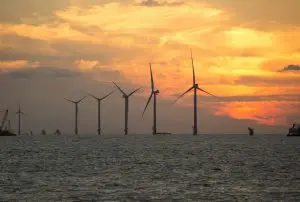As COP26 approaches, Brevia will be tracking the latest milestones in the UK’s preparations for the upcoming climate conference. This week’s developments cover the COP26 priority areas, the publication of the Industrial Decarbonisation Strategy and renewable energy in Scotland.
1. COP26 PRESIDENT SETS OUT KEY PRIORITY AREAS
COP26 President, Alok Sharma MP, delivered a written statement this week in Parliament outlining the four core priority areas for the upcoming climate conference. These were set out as:
- Encouraging countries to set net zero emissions targets, as well as targets for emissions cuts by 2030;
- Developing climate adaptation plans;
- Ensuring equity and fairness in climate finance, with an emphasis on the role that richer countries need to play;
- Collaborating through bringing together Governments, Businesses and Civil Society. [1]
The statement also provided further detail on the governance, structure and parliamentary accountability of the COP26 team. Sharma confirmed that his role will be subject to full select committee scrutiny, with the Chairs of nine Select Committees coming together under the informal ‘Committee on COP26’ to question and examine his team’s activities and progress. Sharma will also face regular questions in the House of Commons, with the next COP26 questions scheduled for after the Easter Recess, on Wednesday 14 April.
Writing in the Guardian, the COP26 President reiterated the importance of these aims and also urged countries to ensure a green recovery from the Covid-19 pandemic stating: ‘We need a green thread running through all Covid-19 recovery packages.’ Sharma also highlighted some of the UK’s achievements so far, including the phasing out of cars and coal, as examples for other countries to follow.[2]
2. INDUSTRIAL DECARBONISATION STRATEGY PUBLISHED
On Wednesday 17 March, the Government published its Industrial Decarbonisation Strategy setting out its blueprint for bringing about the decarbonisation of heavy industry and delivering the world’s first low-carbon industrial sector.
The Strategy includes a number of ambitious commitments, such as cutting emissions by two thirds within the next 15 years, as well as targets to bring ore based steelmaking to near net-zero emissions by 2035.[3]
The paper outlines the Government’s intent to establish the right policy framework and funding mechanisms required to support low-carbon heat innovation. £171 million from the Industrial Decarbonisation Challenge was awarded to nine green tech projects in order to support the deployment and use of Carbon Capture Usage and Storage (CCUS) and low carbon hydrogen.[4]
A further £932 million has been allocated to the Public Sector Decarbonisation Scheme, which provides grants for public sector bodies to fund heat decarbonisation and energy efficiency measures. Of note, the Government extended eligibility for the scheme to include biomass, signalling the Government’s ambition to drive forward heat decarbonisation through a number of different technologies. [5]
3. COMMITTEE TO EXAMINE SCOTTISH RENEWABLE ENERGY
The Scottish Affairs Committee has launched a new inquiry into renewable energy in Scotland as it prepares to host the COP26 climate summit in Glasgow this November. [6]
The Committee is looking to examine how to best deploy and accelerate renewable energy in Scotland, as well as how to ensure a ‘just transition’ for oil and gas workers in the North Sea – something likely to be addressed in the awaited Industrial Decarbonisation Strategy.
The Committee is also seeking to understand how the UK and Scottish Governments can work together to reach their respective net zero goals. The Scottish Government has set in place more ambitious decarbonisation targets than the UK, with the current date for reaching net zero by 2045.
The Committee will also be holding an Oral Evidence session next Thursday 25 March to examine the preparations for the conference. The inquiry will be accepting evidence until the 14 May 2021.
BREVIA CONSULTING PROVIDES STRAIGHTFORWARD POLITICAL AND COMMUNICATIONS SUPPORT TO BUSINESSES AND ORGANISATIONS.
Discover how Brevia can help you and your organisation by contacting the Brevia Energy Team on 020 7091 1650 or emailing us at: contact@brevia.co.uk
Notes
[1] Alok Sharma MP, COP26 President-Designate, Written Statement: COP26 Update, House of Commons, 18 March 2021, link
[2]Alok Sharma MP, The Guardian, ‘Time is running short – but we can get a grip on the climate crisis’, 18 March 2021, link
[3] Department for Business, Energy & Industrial Strategy, Industrial Decarbonisation Strategy, 17 March 2021, link
[4] Department for Business, Energy & Industrial Strategy, ‘Major blueprint to create green jobs and slash emissions from industry, schools and hospitals,’ 17 March 2021, link
[5] Bioenergy Insight, ‘Biomass to be included in UK’s Public Sector Decarbonisation Scheme’, 18 March 2021, link
[6] Scottish Affairs Committee, ‘Scotland’s green energy credentials examined ahead of COP26’, 19 March 2021, link




